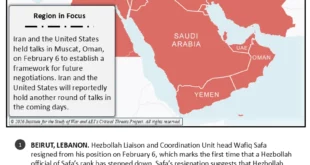 KUWAIT CITY (AFP) — Iran’s influential former president Akbar Hashemi Rafsanjani said Monday he was sure the Islamic republic’s Gulf neighbours would not support any US assault on his country over its nuclear programme.
KUWAIT CITY (AFP) — Iran’s influential former president Akbar Hashemi Rafsanjani said Monday he was sure the Islamic republic’s Gulf neighbours would not support any US assault on his country over its nuclear programme.
“We are certain that Gulf countries will not back the United States in waging an attack on Iran,” Rafsanjani said on the second day of a visit to Kuwait aimed at allaying fears in the region over Iran’s nuclear activities.
“The talk about a US attack on Iran is nonsense and we are sure the Americans would not want to create problems for themselves.”
Rafsanjani also called on neighbouring and other Muslim countries to stand by Iran and warned that any attack on Iran would have implications on the rest of the region.
“All neighbouring and Muslim states should defend and stand by Iran… Any attack on Iran would have implications on the region. The best way to avoid this is by not attacking Iran,” he said.
Rafsanjani, who heads Iran’s powerful Expediency Council, vowed that Tehran would continue the enrichment of uranium.
“Iran wants to continue its activities in this field… and does not intend to suspend the enrichment of uranium,” he said, adding that the Iranian people were not afraid of American threats.
Rafsanjani met with Kuwaiti deputies after holding talks with Emir Sheikh Sabah Al Ahmad Al Sabah.
After the talks, Sheikh Sabah expressed cautious hope that Iran’s nuclear programme was for peaceful purposes, the official KUNA news agency reported.
“The state of Kuwait is cautious regarding the nuclear matters… We hope that what is going on in Iran is for peaceful and not military purposes,” the emir said.
Rafsanjani’s visit follows Iran’s announcement last week that it had successfully enriched uranium to the level needed to make reactor fuel, triggering global concern about its nuclear ambitions.
Uranium enrichment can be extended to make weapons, and the UN Security Council has given Iran’s hardline leadership until April 28 to freeze the sensitive fuel cycle work.
Kuwaiti Parliament Speaker Jassem Khorafi tried to play down the worries in the Gulf over Iran’s nuclear facilities, including a reactor being built with Russian help in Bushehr across the Gulf, and its standoff with the West.
“I am personally not worried because I believe it’s for peaceful purposes,” Khorafi told reporters after meeting Rafsanjani. “I see nothing that should make us afraid.”
The fallout from a fresh conflict in the Gulf would be catastrophic for oil markets given that nearly 20 per cent of the world’s daily oil shipments pass through the narrow Strait of Hormuz.
An influential deputy said the oil-rich, Sunni dominated region was fearful of the escalating tensions in Shiite-led Iran.
“The Iranians are escalating daily and this is terrifying not just for the international community but for the region as well,” said Mohammed Jassem Al Sagr, a liberal deputy, who heads parliament’s foreign relations committee.
He said Iran had to take practical measures on the ground beyond verbal assurances to comfort its Arab neighbours, but did not give details.
Kuwait’s Foreign Minister Sheikh Mohammad Al Sabah said last week that Iran’s nuclear activities must remain under the close watch of the UN nuclear watchdog, the International Atomic Energy Agency.
US-ally Kuwait and other Sunni-ruled Gulf Arab states are concerned about the possibility that the current standoff may develop into a full-scale military confrontation and fear a possible environmental catastrophe if the Bushehr plant is targeted.
The region has witnessed three major conflicts in the last quarter century — the 1980-1988 Iran-Iraq war, the 1991 Gulf War to end Iraq’s occupation of Kuwait, and the US-led invasion of Iraq in 2003.
 Eurasia Press & News
Eurasia Press & News


